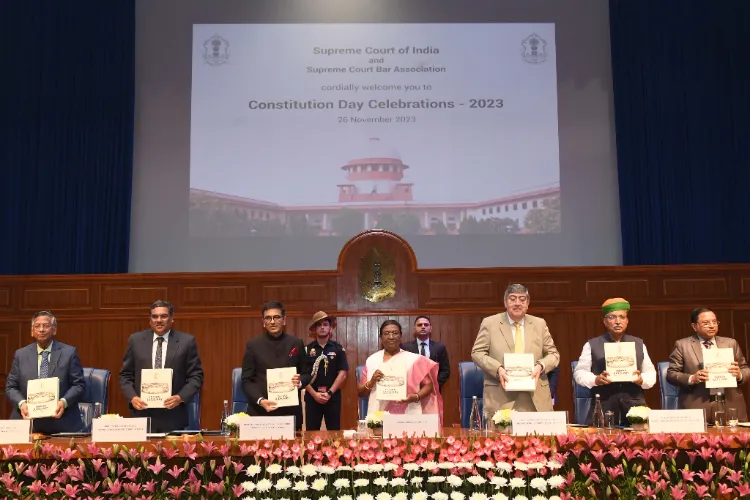President Droupadi Murmu graced the Constitution Day Celebrations organised by the Supreme Court of India
New Delhi
President Droupadi Murmu on Sunday launched various e-initiatives of the Supreme Court and also unveiled a statue of Dr B. R. Ambedkar in the premises of the apex court.
The Virtual Justice Clock, E-SCR (Hindi) and FASTER (Version 2.0), among other initiatives, were launched by the President to bring awareness and transparency about the justice delivery system.
Virtual Justice Clock, now also available in Hindi, provides information about institution, disposal, and case clearance rate (CCR) of courts. The E-SCR (Hindi) will allow users to search for judgments rendered by the top court in Hindi.
The Supreme Court portal has 21,388 judgments translated into Hindi and 9,276 judgments have been translated into other regional languages with the help of artificial intelligence and machine learning.
FASTER (Fast and Secured Transmission of Electronic Records) is a digital platform to communicate interim orders, stay orders, bail orders etc., of the Supreme Court to authorities concerned through a secured electronic communication channel so as to ensure timely release of undertrials.
In her address, the President said that the cause of justice is best served by making it accessible for all and commended initiatives taken by the Supreme Court, in particular, and the judiciary, in general, to expand the scope of free legal aid. "As we celebrate the Constitution Day, we should note that the Constitution is after all only a written document. It comes alive and remains alive only if its contents are put into practice," Murmu said.
Working Sessions on 100 years of Dr B.R. Ambedkar’s law practice, state of the judiciary and institutionalising the use of technology in judicial administration were a part of the day long Constitution-day celebrations in the Supreme Court.
The Ministry of Law and Justice, in collaboration with Indian Law Institute, also celebrated Constitution Day at Vigyan Bhavan in the national capital.
It was on this day in 1949, that the people of India adopted the Constitution.
Vice President Jagdeep Dhankhar graced the occasion as the Chief Guest and delivered the keynote address.
Two books published by the Ministry of Law and Justice and Indian Law Institute titled ' A Guide to Alternative Dispute Resolution' and 'Perspectives on Constitution and Development' respectively, were also relased at the function.
'A Guide to Alternative Dispute Resolution' is an endeavour by the Department of Legal Affairs to enable the common citizens of the country to understand the framework of arbitration and mediation existing in India.
The second book, 'Perspectives on Constitution and Development', is a compilation of articles and lectures delivered by eminent academicians and scholars as a part of a lecture series organised to mark the 75th anniversary of India's independence.
Welcoming the gathering, Dr Niten Chandra, Secretary, Department of Legal Affairs, said that today was a day of celebration, of commemorating a great achievement, an occasion to remind ourselves of the team spirit and dedication of our Constitution makers, who were faced with many challenges at that point of time. He said that our Constitution helped us have an agenda of a free nation.
Tushar Mehta, Solicitor General of India said the resilience of the Indian Constitution can be appreciated from the fact that while many newly independent nations that got their Constitutions almost around the same time faced turmoil, ours has stood the test of time. This is because the makers of our Constitution could foresee all these challenges.
Justice Ritu Raj Awasthi, Chairperson of the Law Commission said that our Constitution did not manifest in one single day but is the result of a long struggle that dates back to centuries.
Justice Indira Banerjee, Former Judge Supreme Court of India, said that our Constitution is people-centric and is a testament to egalitarianism and gender empowerment. She spoke about the need to uphold the values and philosophies enshrined in our Constitution.
Addressing the gathering, Justice Arun Kumar Mishra, Chairperson of National Human Rights Commission said the Constitutional provisions operate to improve the life of an individual and aim at the collective well-being of all. It is a document against arbitrariness and ensures equality and a dignified life for all.
Speaking on the occasion Arjun Ram Meghwal warmly conveyed his best wishes to the gathering on the momentous occasion of Constitution Day.
He named various Constituent assembly members, who were well known and distinguished, and he said we should remember and revere them on this day for their valuable contribution in the making of the Constitution.
The Minister also paid tributes to the far sightedness of Dr B.R. Ambedkar for giving the right to franchise in the Constitution to women at its inception, while many developed countries took years to confer this right, after much struggle.
In his keynote address, the Chief Guest, the Dhankhar said India's growth story in the field of economy, science and technology and its pre-eminence in the comity of nations reflects our Constitutional strength. The Vice President also appreciated recent judicial reforms and modernization, which has made the judiciary more accessible to all.
The dignitaries also gave away awards to winners of the debate on the theme 'Limits to Liberty - Fundamental Rights vs Fundamental Duties' .
As part of the celebrations this year, a national level transformative Colloquium was also organised featuring five technical sessions from 2 p.m. to 4 p.m. The objective of the colloquium was to explore the crucial link between constitutional values, global aspirations, with the well-being of the planet and its inhabitants.

